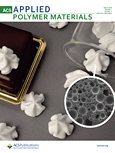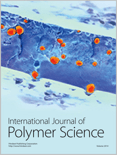
Advanced Industrial and Engineering Polymer Research
Scope & Guideline
Exploring the Frontiers of Polymer Research
Introduction
Aims and Scopes
- Polymer Compatibility and Compatibilization:
The journal extensively covers the compatibility of various polymer systems, including biopolymers and recycled materials. Studies focus on strategies for compatibilization to enhance the performance and processability of polymer blends and composites. - Flame Retardancy and Fire Safety:
A significant area of research within the journal is the enhancement of flame retardancy in polymers. This includes the development of novel flame retardants and the examination of their effectiveness in different polymer matrices. - Biopolymers and Sustainable Materials:
Research on biodegradable and biopolymer systems is prevalent, reflecting a commitment to sustainability. This includes the exploration of biopolymer-based composites and their applications in various industries. - Nanocomposites and Advanced Materials:
The journal highlights advancements in the field of nanocomposites, focusing on their synthesis, characterization, and applications. This includes the incorporation of nanomaterials to improve mechanical, thermal, and barrier properties. - Additive Manufacturing and 3D Printing:
There is a growing emphasis on additive manufacturing techniques, especially regarding the processing and properties of polymer-based materials suitable for 3D printing applications.
Trending and Emerging
- Sustainable and Biodegradable Polymers:
There is a marked increase in research focusing on sustainable materials, particularly biodegradable polymers and their applications in various sectors, reflecting a global trend towards environmental sustainability. - Advanced Flame Retardant Systems:
Emerging studies are exploring novel flame retardant materials and their mechanisms of action, indicating a growing concern for fire safety in polymer applications, particularly in construction and textiles. - Integration of Nanotechnology in Polymers:
The incorporation of nanotechnology into polymer systems is a rapidly growing theme, with research focusing on enhancing material properties and functionalities through the use of nanomaterials. - Biomedical Applications of Polymers:
Research on polymers tailored for biomedical applications is gaining traction, encompassing drug delivery systems, tissue engineering, and biocompatible materials, reflecting the increasing intersection of polymer science with health care. - Smart and Responsive Polymer Systems:
The development of smart polymers that respond to environmental stimuli (such as temperature, pH, or light) is emerging as a key area of interest, indicating a shift towards multifunctional materials with advanced capabilities.
Declining or Waning
- Conventional Polymer Recycling Techniques:
While recycling is still a focus, conventional recycling techniques are receiving less attention as new, innovative recycling methods and biodegradable alternatives gain prominence. - Traditional Thermosetting Composites:
Research centered on traditional thermosetting composites is declining, as the field shifts towards exploring more environmentally friendly and versatile materials that can meet modern demands. - Static Mechanical Properties Analysis:
There appears to be a waning interest in purely static mechanical properties analysis of polymers, with a shift towards dynamic and multifunctional properties that reflect real-world applications. - Non-Biodegradable Polymer Innovations:
Research on new non-biodegradable polymers is less frequent, as there is a broader societal push towards sustainability and the development of biodegradable options. - Basic Polymer Characterization Techniques:
The focus on basic polymer characterization methods is decreasing in favor of more advanced and multifaceted analytical techniques that provide deeper insights into material behaviors and properties.
Similar Journals

JOURNAL OF VINYL & ADDITIVE TECHNOLOGY
Transforming Ideas into Material BreakthroughsJOURNAL OF VINYL & ADDITIVE TECHNOLOGY, published by Wiley, is a pivotal resource in the fields of Chemical Engineering, Chemistry, and Materials Science, offering a platform for the dissemination of cutting-edge research from 1989 to the present. With its ISSN 1083-5601 and E-ISSN 1548-0585, the journal operates from the UK and is notable for its diverse coverage, including insights into polymers, plastics, and innovative marketing strategies specific to this niche. Holding a commendable positioning within the Q2 category in Chemical Engineering and Chemistry, alongside notable ranks in Materials Chemistry and Marketing, this journal delivers impactful research essential for professionals, academics, and students alike. Though not an Open Access journal, it is indexed in prestigious databases, ensuring accessibility to vital findings in vinyl and additive technology. Researchers looking to stay at the forefront of material innovations will find this journal an invaluable asset.

ACS Applied Polymer Materials
Exploring the Frontiers of Polymer ResearchACS Applied Polymer Materials is a prestigious journal published by the American Chemical Society, specifically tailored for the dynamic fields of Organic Chemistry, Polymers and Plastics, and Process Chemistry and Technology. With its ISSN 2637-6105, the journal has rapidly established itself within the academic community, achieving a distinguished Q1 quartile ranking across multiple categories in 2023. This places it among the top-tier journals globally, reinforcing its critical role in disseminating groundbreaking research and innovation in polymer science. The journal is known for its rigorous peer-review process and publishes high-quality articles that are pivotal for researchers, professionals, and students eager to advance knowledge in polymer materials and their applications. Positioned to cover converging themes from 2019 through 2024, ACS Applied Polymer Materials embraces a wide scope of studies, from fundamental chemistry to practical engineering applications, thereby fostering significant advancements in material science. While it offers traditional access options, the journal's impact is reflected in its impressive rankings within Scopus, indicating its relevance and influence in the chemical engineering domain. Join the global community of innovators and discover the latest insights that continue to shape the landscape of applied polymer research.

JOURNAL OF POLYMER RESEARCH
Pioneering Insights into Polymer Science and TechnologyJOURNAL OF POLYMER RESEARCH is a leading peer-reviewed journal published by SPRINGER, specializing in the dynamic fields of polymer science, materials chemistry, and organic chemistry. Operating since 1994, this esteemed journal has consistently delivered high-quality research articles that illuminate the latest advancements and innovations in polymer technology. With an increasing impact factor and placed in the Q2 category for both Materials Chemistry and Polymers and Plastics, it stands as a valuable resource for researchers, professionals, and students seeking cutting-edge knowledge in these areas. The journal is indexed in Scopus, highlighting its significance in the academic community, with notable rankings in Materials Science and Organic Chemistry. While it does not currently offer open access options, the meticulous selection of research and thorough peer-review process ensures each article's contribution to the field is both robust and impactful. Researchers aiming to expand their understanding and engage with pioneering studies will find JOURNAL OF POLYMER RESEARCH an indispensable platform.

POLYMER BULLETIN
Unveiling Innovations in Polymer ResearchPOLYMER BULLETIN is a prominent journal in the field of polymer science, published by SPRINGER in Germany. Established in 1978, this peer-reviewed journal focuses on the latest research and developments in polymer chemistry, materials science, and condensed matter physics, boasting a commendable impact factor indicative of its rigorous academic standards. With a Q2 ranking in multiple categories including Chemistry (Miscellaneous), Condensed Matter Physics, Materials Chemistry, and Polymers and Plastics, POLYMER BULLETIN serves as an essential resource for researchers, professionals, and students aiming to stay abreast of innovative findings and methodologies within these interdisciplinary landscapes. Although the journal does not currently offer open access, it provides invaluable insights and data that significantly contribute to the advancement of polymer science. For more information and to access published articles, visit the journal's page on the Springer website.

IRANIAN POLYMER JOURNAL
Pioneering Knowledge in Polymer EngineeringWelcome to the Iranian Polymer Journal, an esteemed publication encompassing a rich history since its inception in 1996 and extending its scholarly reach up to 2024. Published by Springer from Switzerland, this journal stands out in the fields of Chemical Engineering, Materials Chemistry, and Polymers and Plastics, proudly holding a Q2 category ranking in each of these disciplines for 2023. With an ISSN of 1026-1265 and an E-ISSN of 1735-5265, the journal serves as a vital resource for researchers, professionals, and students, offering insights into polymer science and interdisciplinary applications. Although not an open-access journal, it presents an invaluable platform for high-quality research dissemination and robust peer-reviewed articles. With Scopus rankings indicating its respected position within the academic community, the Iranian Polymer Journal is committed to advancing knowledge and fostering innovation in polymer-related studies, making it an essential addition to your research library.

MACROMOLECULAR MATERIALS AND ENGINEERING
Pioneering Research in Materials Science and EngineeringMACROMOLECULAR MATERIALS AND ENGINEERING, published by Wiley-VCH Verlag GmbH, is a distinguished open-access journal that since its inception in 1989 has been at the forefront of research in the fields of Chemical Engineering, Materials Chemistry, and Polymer Science. Recognized with a top-tier Q1 ranking in multiple categories for 2023, including Chemical Engineering and Organic Chemistry, this journal facilitates cutting-edge discoveries and advancements by providing a platform for authors to share innovative findings. With an impressive Scopus ranking, positioned within the top percentiles in several interdisciplinary categories, MACROMOLECULAR MATERIALS AND ENGINEERING is an essential resource for researchers, professionals, and students who are engaged in the development and application of macromolecular materials. As an open-access journal since 2023, it enhances accessibility and fosters collaboration within the global scientific community. The journal, headquartered in Germany, aims to publish high-quality, peer-reviewed articles that drive the scientific dialogue forward in the rapidly evolving fields of materials science and engineering.

ADVANCES IN POLYMER TECHNOLOGY
Connecting Knowledge with Cutting-Edge Solutions.ADVANCES IN POLYMER TECHNOLOGY is a premier open-access journal that has been at the forefront of innovation in the field of polymer science and engineering since its inception in 1981. Published by WILEY-HINDAWI, this journal serves as a vital platform for researchers, professionals, and students alike, facilitating the dissemination of cutting-edge research and applications in chemical engineering, organic chemistry, and polymers and plastics. With an impact factor that signifies its relevance and quality, the journal has achieved notable rankings, including Q2 in Chemical Engineering, and ranks within the top 30% of its category in multiple disciplines as of 2023. ADVANCES IN POLYMER TECHNOLOGY has embraced open-access publishing since 2019, ensuring that research findings are widely available to the global academic community. With its comprehensive coverage of topics related to polymer technology, this journal not only fosters scholarly exchange but also aims to bridge the gap between fundamental research and practical applications, thereby contributing significantly to advancements in materials science.

Polymer-Plastics Technology and Materials
Pioneering Research in Materials ChemistryPolymer-Plastics Technology and Materials is a premier academic journal published by Taylor & Francis Inc., dedicated to the dynamic fields of chemical engineering, materials chemistry, and polymers and plastics. With an impact factor that reinforces its reputation, this journal is strategically indexed in Scopus, ranked notably within its categories (Q2), showcasing its influence and relevance in the academic community. Since its inception in 2019, the journal has served as an essential platform for researchers, professionals, and students to disseminate innovative studies and advancements in polymer science and materials technology. As an Open Access publication, it ensures that cutting-edge research is accessible to a global audience, fostering collaboration and knowledge sharing in the material sciences. Located in the United Kingdom, Polymer-Plastics Technology and Materials continues to enhance the dialogue within the industry, addressing critical challenges and exploring emerging trends that shape the future of polymer and plastics technologies.

POLYMER-KOREA
Unveiling Breakthroughs in Polymer Science Since 1996POLYMER-KOREA, an esteemed publication by the POLYMER SOC KOREA, serves as a vital platform for disseminating groundbreaking research in the domains of Chemical Engineering, Materials Chemistry, and Polymers and Plastics. Founded in 1996, this journal aims to bridge the gap between academic inquiry and industrial application, fostering innovation in polymer science. With an ISSN of 0379-153X and an E-ISSN of 2234-8077, POLYMER-KOREA provides a rigorous peer-reviewed environment, although it does not currently offer open access options. Based in Seoul, South Korea, and slated for converged years up to 2024, the journal is indexed in Scopus and has been ranked in the 2023 Q4 category in its respective fields, highlighting its niche yet competitive position within the academic community. Researchers, professionals, and students alike will find the journal an invaluable resource, honing in on critical advancements and fostering collaborative discussion within the spectrum of polymer science.

International Journal of Polymer Science
Pioneering Research in the Polymer LandscapeInternational Journal of Polymer Science is a prominent and peer-reviewed journal dedicated to advancing the field of polymer science. Published by Hindawi Ltd, this open-access journal has been making significant contributions to the discipline since its inception in 2009, ensuring that research findings are accessible to a global audience. With an impressive impact factor and positioned in the Q2 quartile for Polymers and Plastics as of 2023, it ranks 46th out of 161 in the Scopus database, reflecting its strong standing in the research community. The journal welcomes innovative research across various topics within polymer science, including synthesis, characterization, and applications in diverse industries. By providing a platform for scholars, professionals, and students, the International Journal of Polymer Science not only encourages the dissemination of knowledge but also fosters collaboration and innovation in this essential field. Based in Egypt and operating under a rigorous selection process, it remains a vital resource for anyone involved in polymer research.